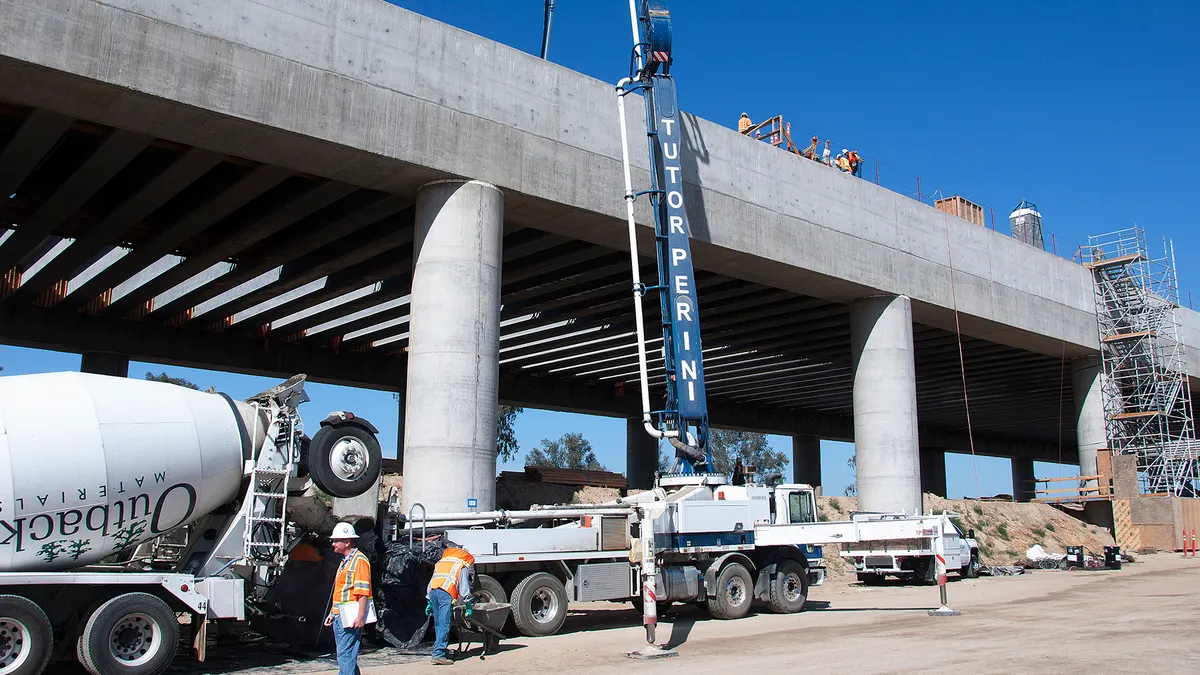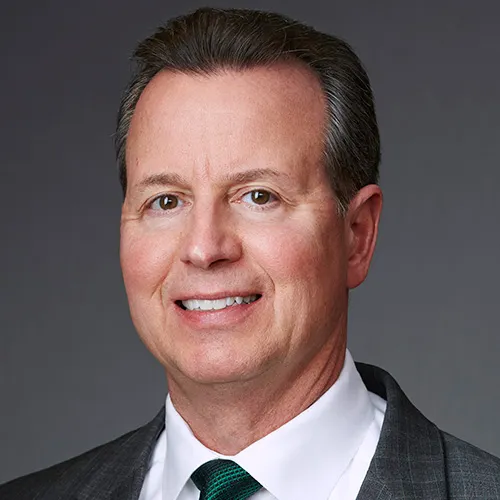An article from

The Los Angeles-based firm posted record backlog and its highest revenue since 2009 for the second quarter as its strategy to take on megaprojects produced results.

Workers at Tutor Perini’s segment of the California high-speed rail project, which runs from Madera to Fresno.
Courtesy of Tutor Perini
This audio is auto-generated. Please let us know if you have feedback.
For years, Tutor Perini executives have asked investors for patience as the company worked through dispute resolutions on older projects and ramped up new, multibillion-dollar jobs.
That patience is now paying off.
The Los Angeles-based contractor had one of its “best quarters ever” during Q2 2025, according to CEO Gary Smalley, as its backlog more than doubled from a year ago to achieve a new company record and revenue hit its highest point since 2009.

Gary Smalley
Courtesy of Tutor Perini
The firm’s leadership said it wasn’t feeling any impacts of tariffs on its projects and doesn’t anticipate any for the foreseeable future. It said the macro funding environment remains robust, even for its portion of California’s high-speed rail project, which President Donald Trump has tried to derail by rescinding $4 billion of federal money.
Indeed, the results were so good that they seemed to surprise even the firm’s top brass.
“Overall, Tutor Perini’s business continues to perform extremely well and frankly even better than we anticipated at the start of this year,” CEO Gary Smalley said on a second quarter conference call Aug. 7 to discuss the firm’s results. “We are at the beginning of the life cycle for several major higher margin projects that are expected to derive substantial growth, profitability and cash flow as project execution activities continue. What you’re seeing now is just a preview of what these projects should produce on a larger scale in the coming years.”
That momentum led the firm to increase its financial guidance for only the second time in its history — and the second time it has done so this year. The company said it was raising its earnings guidance to a range of $1.70 to $2.00 per share, up from $1.60 to $1.95 per share for the year, and anticipates profits for 2026 and 2027 to be even higher.
Those buoyant results stand in stark contrast to those from Fluor, which said tariffs and economic uncertainty had sapped its backlog and triggered cancellations among its customers.
When an analyst asked what drove Tutor Perini’s upward revision, Smalley said the company’s work on new projects was simply unfolding more smoothly and faster than it originally expected, and that it wasn’t hitting the snags it had in the past.
“The project execution, you know, the ramp up of some of these projects, was a little quicker than we anticipated,” Smalley said. “We factored in some contingency or some expectation that things would not go as brilliantly, let’s say, as they did.”
The firm had reason to be cautious with its estimates. For example, it posted a $171 million loss for 2023 as disputes over its past projects caused massive writedowns.
But now, Smalley said at 2025’s halfway point, the firm had only used about one-third of the contingencies — or wiggle room for things like cost increases and project delays — that it had baked into its projections at the beginning of the year.
“Work in some of the units, some of the smaller work, came in, we’ll say, more timely than we anticipated, so that also helped,” Smalley said.
No hit from tariffs
Smalley also made it clear to investors that Trump’s tariff policies weren’t having a negative impact on the contractor’s business to date and weren’t anticipated to do so in the future.
“When we were talking about tariffs not having an impact, we’re not just talking about up to now,” Smalley said. “We’re talking about looking forward as well for each of our major projects.”
Smalley said the firm re-evaluated its tariff risks on its major ongoing projects in the quarter — for instance, due to rising steel prices — but because it had bought out both materials and labor for those jobs in advance, it had already locked in its costs. For new jobs going forward, it plans to bake higher prices into its bids, meaning project sponsors will need to cover them.
“Any possible exposure that we might have for tariffs, I can tell you that it was even less exposure than what we had seen last quarter,” Smalley said.
California high-speed rail on track
Smalley also said that Tutor Perini wasn’t facing project cancellation risk, despite the broader uncertainty over the economy, including on its $3.55 billion contract for completing 32 miles of California’s high-speed rail project.
“In recent discussions with this customer regarding the federal government’s decision to reduce funding on the overall program, the customer confirmed that our project is funded and authorized and is not expected to be adversely impacted,” Smalley said.
Reduced competition
The contractor’s strategy of being one of the last firms standing in terms of bidding on multibillion-dollar megaprojects, where prolonged timelines make it challenging to accurately foresee cost increases and delays, has also been working.
Ron Tutor, Tutor Perini’s executive chairman, said the company has seen fewer bidders on major jobs, as many contractors have chosen not to take on the risk that’s inherent in these kinds of massive undertakings.
“I’ve talked about that for the last two to three years: We have never seen more than one other bidder in the last two years, and on … two occasions, we were the only bidder,” Tutor said.
That competitive landscape — or lack thereof — has allowed the firm to be choosy in the jobs it does pursue, while also naming its price. Those factors have only turned more in Tutor Perini’s favor as its backlog has ballooned.
“Our record backlog continues to enable us to be highly selective as to which opportunities we will pursue and to focus on bidding projects that have favorable contractual terms, limited competition and higher margins,” Smalley said.
In fact, in the company’s civil segment, which handles heavy infrastructure projects, profit margins are now approaching 15%, Smalley said, up from 8% to 10% in previous years. “We’d like to expand on that further,” Smalley said.
By the numbers
For the second quarter, Tutor Perini reported revenue of $1.37 billion, up 22% from the $1.13 billion it realized in the same period last year. Backlog grew to $21.1 billion, a company record, up 102% from a year ago.
And net income came in at $20 million, up from $800,000 during Q2 2024.
If there were any blemishes in the company’s report, they came from Tutor Perini’s specialty segment, which focuses on electrical, mechanical, plumbing and HVAC. The unit posted a loss of $18 million in Q2, wider than the $8 million loss it posted a year ago. The firm attributed the loss to about $15 million in unfavorable adjustments due to the settlement of legacy claims in the Northeast.
Despite that pock, analysts on the call applauded the company’s second quarter performance, while shareholders voted with their pocketbooks. The company’s share price has more than doubled since its 2025 first quarter earnings report, when the firm first signaled its strategy was getting traction. Shares leaped another 20% after the firm’s call this week.
“Everyone’s been patient for a long time to see the results that we’ve generated,” Smalley told analysts. “We’re growing the business at a very significant clip.”


